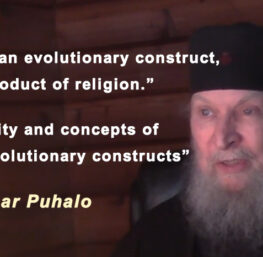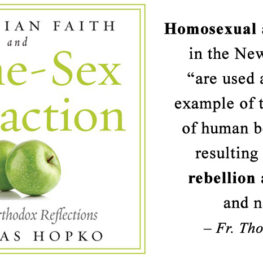 by Hank Hanegraaff –
by Hank Hanegraaff –
Creation versus Evolution. As the debate rages, there remain those who contend that they can subscribe to modern evolutionary theory and, at the same time, believe in God’s Good News as revealed in the Bible. Is this belief in Theistic Evolution truly rational?
What Is Theistic Evolution?
Proponents of theistic evolution claim that God created man by evolutionary processes, that is man is said to have evolved from lower forms of life. If this were the case, then all life, including man and his presumed ancestors, would have been subject to death throughout history. This is because theistic evolution depends on death to weed out lesser fit organisms to make room for the development and refinement of surviving species.
However, the Bible tells us that death came about as a result of sin. If Adam had not eaten of the forbidden fruit, if he had not fallen into a life of constant sin terminated by death, what need is there for redemption? None! What all of this means is that we cannot give up the Genesis account of creation, but we could the doctrine of Geocentrism and get along.
death overcame man when he transgressed God’s command
Scriptural Difficulties with Theistic Evolution
Genesis 3 unmistakably asserts that death overcame man when he transgressed God’s command. Death, according to Scripture, had no hold on man until some later period following his creation. This flies directly in the face of theistic evolution theory. Still, proponents of theistic evolution may try to skirt these passages by regarding the opening portion of Genesis as non-historical. But such recourse can only lead them to even more disastrous avenues.
Theistic evolutionists can allegorize Genesis as much as they want, but to do so, they have to contend against Scripture itself. Paul, in such passages as Romans 5 and 1 Corinthians 15, clearly treats the Genesis account in historical terms and he speaks of human death as God’s judgment on sin. It was for this very reason—to answer for God’s punishment for our sin—that Christ died. This is the very heart of the Gospel. Quite frankly, Theistic Evolution, in my opinion, is a contradiction in terms, somewhat like talking about burning snowflakes.
theistic evolutionists only wind up perverting God’s Good News into no news
Denying that Death is Result of Man’s Sin
But if human death were not God’s judgment on sin, as proponents of theistic evolution would have to maintain, what then did Christ die for? Those clinging to theistic evolution dogma would have to admit that Jesus lied when He claimed to die for our sins. Consequently, the atonement is robbed of all meaning, while the Gospel is hollowed to an empty shell. In their attempt to fuse evolutionary theory with Scripture, theistic evolutionists only wind up perverting God’s Good News into no news, as we remain dead in our sins.
HT: Christian Research Institute
_______________________________
Hendrik “Hank” Hanegraaff, also known as the “Bible Answer Man,” is a former American Evangelical Christian author and radio talk-show host who converted to Orthodox Christianity (along with his wife) in April 2017.
‘Bible Answer Man’ Converts to Orthodoxy
www.christianitytoday.com/news/2017/april/bible-answer-man-hank-hanegraaff-orthodoxy-cri-watchman-nee.html
For an Orthodox Christian understanding of “atonement” please see Fr. John Whiteford’s article, Stump the Priest: The Atonement.





Was God mistaken, then, when He said, “…for in the day that you eat of it you shall surely die” (Gen 2:17)? Because Adam and Eve did not physically die the same astronomical day they ate of the tree, it stands to reason that the death God is referring to is spiritual death, a consequence of which later is physical. So, the death is both spiritual and physical, but first spiritual. Understood in this way, Theistic Evolution is not necessarily incompatible with the Bible and Christian Theology. In fact, the idea of spiritual death resulting from sin can be found elsewhere, not only in the Scriptures but also in the Patristic writings.
I was certainly surprised to see Hank Hanegraaff’s article on Creationism focusing so much attention on on the issue of sin, as an explanation for Creationism. The most specific sentence I could find was: “. . . the Bible tells us that death came about as a result of sin. If Adam had not eaten of the forbidden fruit, if he had not fallen into a life of constant sin terminated by death, what need is there for redemption? None!”
I would be happy to spend some time with H. Hanegraaff to explain the confusion of the issues. Many Theistic Evolutionists, those who believe God used evolution to create humans and the millions of other species on Earth, either see Adam & Eve as being compatible with Evolution, or at the very least, figurative references to the first humans to encounter and act on morality!
In fact, this is explained in Vladimir De Beer’s excellent article right here on OrthodoxyToday.Org: “Genesis, Creation and Evolution”! [ https://www.orthodoxytoday.org/view/de-beer-genesis-creation-and-evolution ], published May 25, 2010.
While there are organizations that emphasize the symbolic nature of Adam & Eve (such as BioLogos.Org), there is a very new organization that is focusing on the thesis outlined by De Beer. PeacefulScience.Org has begun exploring the theological as well as biological evidence for corroborating the idea that Genesis 1 refers to the slow evolution of humanity (through God’s use of Evolution and Natural Selection), while Genesis 2 refers to the miraculous special creation of Adam & Eve anywhere between 100,000 years ago to 6000 years ago (preferred by many Creationists).
Rather than being figures of speech, or symbols, Adam & Eve are flesh and blood humans made by God to bring redemption and atonement to the rest of humanity – – that knows not God’s ways and knows not about the righteousness that God seeks for humanity.
The combination of both miraculous creation and evolutionary creation appeals strongly to many who have become weary of the endless bickering between Creationists and Evolutionists. All Christians are already used to accepting some amazing miracles. So special creation of Adam is not really a problem – – except if Creationists want to ignore millions of years of natural evidence, in the manner of fossils, geological measures of time and cross-referenced physical sciences that make it plain to all that the Earth is older than 6000 years.
By combining the two forms of creation used by God, in theologically appropriate ways, all mankind can find peace in acknowledging God’s ways for creating humanity for his divine purposes, along with the way to redeem the needs of all men and women in a way that unites us all in the ultimate expression of the Father’s godhead.
Mr Brooks…you seem to be assuming that molecules to man evolution is a scientific fact (please correct me if I am wrong on what I see as your assumption). This could be nothing father from the truth. There is no real scientific evidence to support it. Moreover, the more we have learned about biology, the idea that life can be generated from a mixture of chemicals and then transformed into higher life forms seems scientifically impossible. The concepts of randomness and survival of the fittest cannot be allowed to replace God’s plan and man’s special place within it.
Great comment by Greg Brooks. There is a huge difference between creation and then evolution of the universe and the life forms in it, on the on hand, and of Adam (and Eve) who were made in the image and likeness of God. I am glad that Mr. Brooks explained it much better than I could.